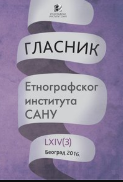Религија и насеље као чувари народносног
Religion and Settlement as Preservers of Ethnicity
Author(s): Mirko BarjaktarovićSubject(s): Theology and Religion, Cultural Anthropology / Ethnology, Nationalism Studies, Ethnic Minorities Studies, Identity of Collectives
Published by: Етнографски институт САНУ
Keywords: ethnic identity; ethnicity; religious affiliation; ethnic group; settlement; isolationism; adaptation; acculturation; national identity;
Summary/Abstract: A separate ethnic group living in an isolated settlement could preserve ethnic identity even when surrounded by an alien ethnic environment. This is even more likely to happen if the ethnic group in question has a different religious affiliation than the rest, since the religious affiliation and ethnicity were often equated in the area examined. This paper presents a few cases of ethnicity preservation (sometimes its loss), namely: (1.) The Sarakačans group (a Greek speaking ancient Balkan population); that is, its lineage Ašana in Goč (nearby Kraljevo); (2.) Serbs in White Krajina (Slovenia) and Zumberka (Croatia); (3.) Serbs from former Montenegro settled in the village of Peroj, in Istria; (4.) Catholic Albanians, tribe Klimenti, settled in Srem’ villages Nikinci, Hrtkovci and Jarak, who declare themselves to be Croatians today; (5.) A Serbian population from Montenegro and parts of Herzegovina (various tribes from Ceklina, Bjelopavlić, Riječka nahija, Njeguš, Grahovo and Zubac), from Petlovo Selo, in northeast Serbia; (6.) Torbeša families, from the group Mijaka, an originally Slav-Islamic population in the Cmi Drim area, that immigrated in the 1960’s to Izmir, in Turkey; (7.). Janjevci, Catholics of a mixed Slavic origin, from Janjevo, near Pristina; in the past they declared themselves natives of Dubrovnik, but lately declared themselves Croatians; (8.). Slovak Adventists from Gospodjinci, in Srem, who declare themselves to be Serbs; and (9.). Slovaks, Greco-Catholic, from Kučura, Bačka, who declare themselves as Ruthenians although their native language is Slovakian. In conclusion, the author argues that ethnic identity preservation depends on a lot of factors and circumstances, among which the most important are settlement and religious affiliation. Many of the positive experiences of multilingual, multinational and multireligious tolerances in the area could serve as a model in other potentially troubled multicultural environments.
Journal: Гласник Етнографског института САНУ
- Issue Year: LII/2004
- Issue No: 1
- Page Range: 187-197
- Page Count: 11
- Language: Serbian

